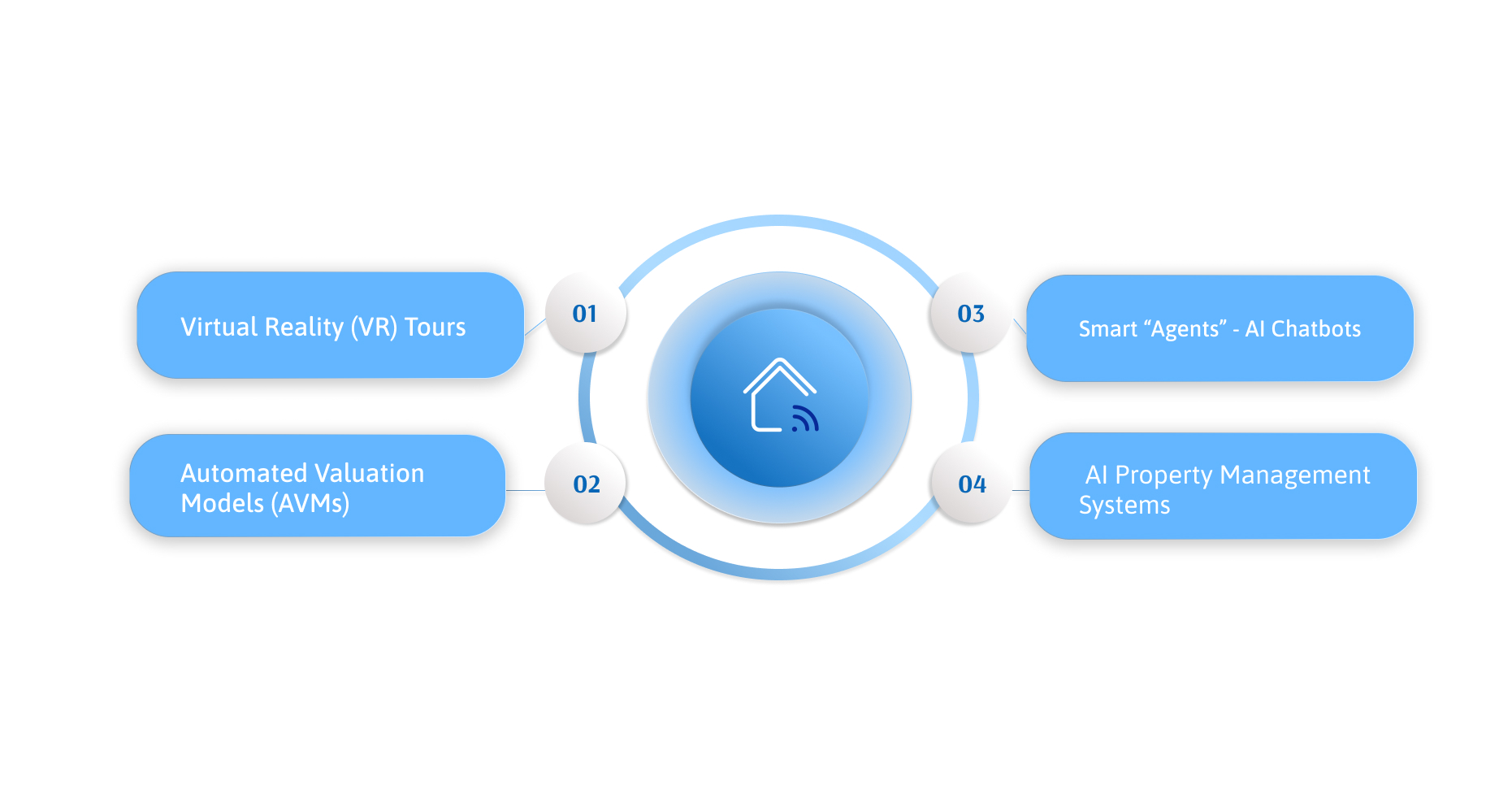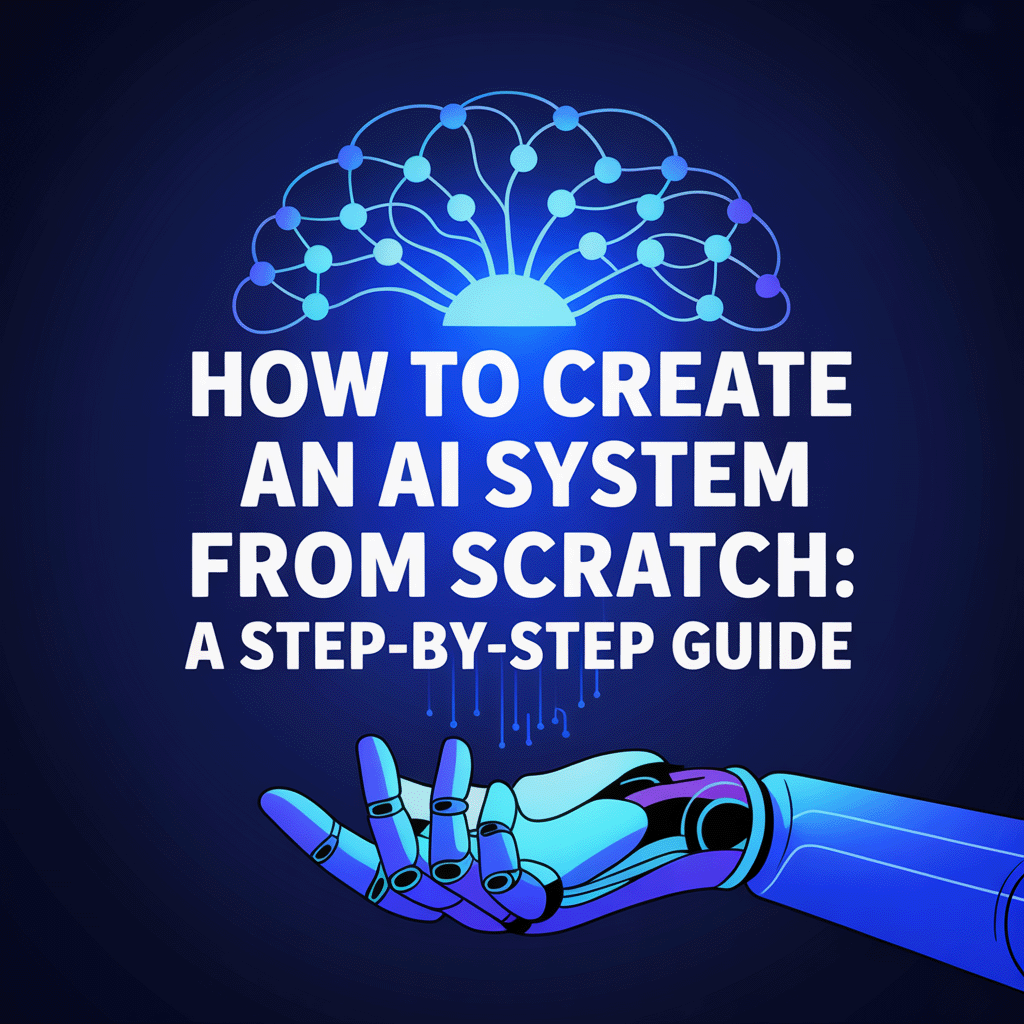AI in real estate is a win-win solution: the potential buyer saves time and effort buying their dream house, while the real estate agent attracts the client with personalized listings and mesmerizing VR tours.
Just imagine a potential buyer who wants to buy a house near the seashore with a picturesque view, but they can’t describe the house’s features. AI can help customize listings by analyzing the real estate marketplace and customers’ previous transactions and estimating the value.
Today, we’ll look at the best AI practices in real estate, what benefits you can reap from implementing machine learning algorithms, and check out real-world examples of AI solutions from well-known companies like Zillow and Realtor.
AI and Real Estate
Integrating AI into software applications spans all industries, including private and state sectors, and real estate is no exception. According to a MaximizeMarketResearch report, the real estate market faces significant changes and is forecasted to reach US $1335.89 billion by the end of 2029.
So, what is the reason behind the rapid dynamics? The answer is AI-powered solutions. The real estate market has always been a significant part of global economic growth, as individuals and businesses constantly search for residential and commercial premises and real estate for investment purposes.
The history of implementing AI in real estate goes back to 2012, when PropTrack, an Australian company, presented the first AI-powered property valuation tool. It was the starting point of the AI boom in real estate, which took years to spread around the globe. Since 2022, the real estate market has flourished with the integration of 3D modeling tools, generative descriptions, and market predictive AI.
AI is transforming the world, including real estate businesses, giving us a new perception of purchase patterns. Is it good or bad? Let’s see.

Key Benefits of AI in Real Estate
According to real estate market research, the main scope of using AI in real estate is identified by the following functions: prediction, finding information, analyzing, extracting patterns, and optimizing processes.
Real estate agents and brokers with a wide range of tasks and responsibilities in guiding the “possible” buyer to their dream house are leaning on advancements in technology to escape repetitive tasks. This is called strategic management – waste less time and gain more leads. The primary function of currently available AI tools and custom AI software solutions is to complete specific tasks within the home-buying process and enhance the customer experience.
The benefits of human-AI cooperation are vast:
- 24/7 Operation
Real estate agents can sleep and rest, and potential customers are still satisfied. AI technology integrated into the website or application works nonstop, sorting out property listings, analyzing user behavior, and initiating business deals.
- Minimizes Transaction Time
AI is trained to identify different types of documents related to real estate transactions and detect errors. For instance, the AI software Drooms NXG offers a virtual space to store documents and transaction-related information. The NLP (Natural Language Processing) technology also allows for the analysis of documents to identify patterns or locate errors.
- Accurate 3D Modelling
Fewer people would buy a property or contact the seller for an actual walk-through without a prior virtual tour providing insights into rooms’ location, living convenience, and inner furniture (if applicable). With the advent of “digital twins,” also called AI-computer models, customers can explore the space digitally from their comfort zone.
- Enhanced Marketing Solutions
Many fake buyers simply visit sites to look at properties for fun or work purposes, not to buy them. AI technology allows for filtering irrelevant visitors and determining actual ones. By using chatbots, it is getting easier to spread the word about the property and analyze customer behavior.
How is AI Used in Real Estate? Best Use Cases and Solutions
Real estate solutions come to use with new emerging trends in AI and ML and differ in their functional features and primary goals. Yet, all AI tools and solutions are applied to transform the way buyers and sellers communicate, negotiate on price, and close the deal. Separately, some automation solutions allow for the analysis of the market and even the evaluation of property! Let’s check the key use cases of AI in real estate.

Running Virtual Reality (VR) Tours
One factor that propelled the real estate market is the integration of VR tours into the listings, saving the buyer and seller valuable time. Now, potential buyers can remotely explore the outside and inside conditions of any house through a virtual reality experience. Now, a buyer can determine if they like the house in minutes and move on to the next one.
During the VR tour, a buyer can:
- Walk through property rooms and halls;
- Examine details closely;
- Immense in the realistic feel of space.
Exploiting Automated Valuation Models (AVMs)
AVMs are built using AI technology and machine learning algorithms to analyze different properties and give further evaluations. The AI model analyzes property location, market insights, sales data, and any relevant features that help to accurately evaluate the total price. This type of AI application in real estate eliminates human error and bias and provides objective and fair prices. At the same time, agents and brokers shouldn’t worry about document safety and ethical issues when using AI.
Wall Street uses this automated solution to estimate residential premises. Zillow and Trulia, well-known property listing apps, use it to analyze property on listings and generate values according to market patterns.
Integrating Smart “Agents” – AI Chatbots
AI-powered chatbots have revolutionized how customers interact with real estate agents, brokers, property managers, and businesses. They have enhanced the communication process and improved user experience tenfold.
A real estate chatbot is a virtual assistant that helps to connect a buyer with the seller, answers questions about the renting or buying procedures, and even schedules meetings.
While many real estate agents and brokers have stuck with traditional property sales methods and human interaction, many giant companies have invested in developing real estate mobile apps with chatbots like Tidio, Mobile Monkey, or Landbot. AI chatbots are profitable because they:
- offer easy integration to CRM systems, websites, and social media messenger channels like WhatsApp and Facebook;
- schedule property viewings and virtual tours;
- provide market analysis and future insights;
- provide 24/7 availability with full property listings;
- offer clients personalization and monitor interactions.
Working With AI Property Management Systems
Property managers who strive to provide excellent living conditions try different methods to safeguard their profit and customers’ positive experiences. One way to manage all tasks and track property maintenance is to utilize AI property management systems.
For example, real estate agents may now use smart management systems like Verdigris and Pointgrab. Verdigris optimizes property management, and Pointgrab provides tracking information inside the premises. The overall benefits of using smart management systems are:
- controlling movement inside the premises;
- tenant communication;
- property marketing;
- tracking property listings;
- tracking renter’s applications.
Despite many existing AI solutions, not all may help you overcome your business challenges. If you wonder how to use AI in real estate, firstly, you should:
- Identify The Challenge and Final Goal. First, research how AI should help you and what results you want to achieve. Elevate the current business processes, hold content expertize, and set your goals and objectives.
- Choose an AI Solution. Next, research the available real estate AI tools and whether any of them can help you overcome the existing challenges. If there is no ready-to-use AI tool for your goals, consider building a custom solution and developing personal software. To do that, you’ll need to create a product roadmap, where you indicate what features to include in the product, its functionality, budget, and deadlines.
- Choose a Software Developer. To create a unique and workable product, find the software development team that meets your expectations and the budget scope. Choosing a real estate developer with experience in applying the best AI solutions in the industry is essential.
Whether you have chosen to create personal AI software for marketing goals or automate business processes, remember to test the final product and monitor its performance.

Examples of AI in Real Estate
Now that we have grasped how artificial intelligence and the real estate industry can interact, let’s look at giant real estate agents and companies that have successfully grasped new trends in AI. They will provide us with good examples of intelligent decision-making.
- Realtor. To improve user engagement and automate bookings, the company has successfully launched Dream Home Builder, an AI application developed with Addition Technologies Inc. This application helps users match houses with their preferences and customize listings. Yet, the best feature of Dream Home Builder is that it generates a house/building prototype and searches for a match among existing listings.
- Zillow. This platform, known for its millions of for-sale and rental listings, made the house-hunting process even easier and profitable by implementing a natural language search feature that allows users to type the query right into the search bar without further filtering. Zillow continues to invest in machine learning and AI to develop the real estate market and improve lead generation.
- Opendoor. This online company successfully uses AI in real estate transactions directly through the platform. AI manages all real estate deals, including listing personalization, search optimization, selling procedures, and transactions. With Opendoor’s solution, buyers can choose a property and have a direct online walk-through (virtual tour). You can purchase the home or premises directly through the app or by calling Opendoor’s service agent.
Conclusion
Hopefully, this article has provided you with a bunch of new information and ideas to implement in your real estate business, from integrating a chatbot into your website to automating business processes and adding virtual tours to your listings.
However, to make the business run smoothly with new AI features, you must find the right software developer to analyze your business processes and bring the best AI solutions at a reasonable price.
At LITSLINK, our team follows the best software development and automation practices across different industries, including real estate. If you want to upgrade the state of your business with AI, feel free to contact us and learn more about AI applications in the real estate industry.





